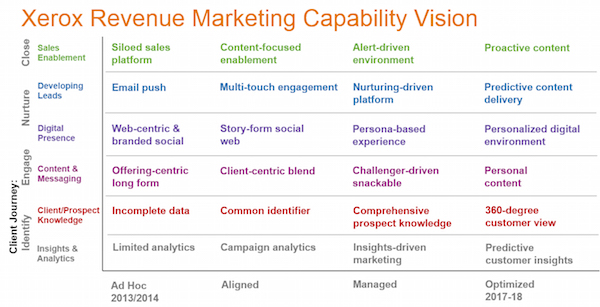In preparing for the upcoming MarTech Europe conference — as a promotional interjection, please note that discounted “beta rates” for tickets expire next week — I’ve had a number of terrific chats with Stephan Pretorius, the co-founder and president of Acceleration, a WPP marketing technology services firm.
Stephan will be one of our featured speakers in the closing fireside chat at our conference next month, cheekily titled: Everyone Wants To Be The CMO’s Best Friend: A Discussion Among Agencies, Systems Integrators & Management Consultants.
In advance, Stephan was kind enough to take some time to share his perspective on helping marketers tame the marketing technology beast.
1. Can you start by telling us about your background, what your career journey has looked like?
My career journey has been quite linear and one-dimensional compared to most people. I studied media law and telecoms at Columbia Law School and had some brief experience in pay-TV before setting up the first international ad network running on the DoubleClick platform in 1997 in South Africa. I started Acceleration two years later, at age 27, and have been growing it with my partners as a specialist marketing technology consultancy and systems integrator ever since.
We took very little start-up capital, so the business grew slowly in the early years, but that was probably a blessing as it gave us time to learn our craft, develop a strong culture, and implement good processes and systems. It also took time to internationalize our business from our original South African roots into the US, UK, Europe, and Middle East.
In 2012, after 13 years of organic growth, we sold a majority stake in Acceleration to WPP, who have been a fantastic parent company. On the one hand, having access to a much wider set of marketing services disciplines and some of the best marketing talent in the world has massively expanded and improved our own practice. On the other, having access to much larger and more complex global clients has challenged us to learn faster, be smarter, and compete harder.
2. Is Acceleration representative of a fundamentally new kind of agency? You’re not a digital agency, the way that’s been previously conceived, but really more of a marketing technology agency?
We don’t really position ourselves as an agency at all, despite being owned by the largest marketing services group in the world. We are fundamentally a consulting and systems integration business and compete daily with the likes of Accenture, Deloitte, and Cap Gemini. We call ourselves “strategic marketing technologists” to communicate our central focus on how marketing and brand strategy intersects with technology capability.
We call ourselves “strategic marketing technologists.” Our central focus [is] on how marketing and brand strategy intersects with technology capability.
And while our focus and core skills set is around marketing and advertising technology, those boundaries are blurring daily with adjacent innovation in areas such as IoT and wearables, on the one hand, and the convergence of enterprise IT (CRM, ERP, BI) systems with marketing technology. So it’s really a very exciting and fast-moving landscape to work in.
3. What do your engagements with clients look like? Are these well-defined projects with a beginning and an end? Or is there an ongoing relationship?
Most of our engagements have a strong long-term vision that drives multiple sequential and simultaneous work streams. Those individual work streams all have very clear project plans and tend to last anything from 3 to 12 months. We do have some ongoing managed services engagements, but that is a smaller part of our overall revenue.
4. What’s the interaction like between your firm, your client’s marketing team, and your client’s IT team? Are you a referee? An alternative? A marriage counselor? Have these dynamics been evolving? If so, how?
Almost all our engagements require us to interact with both marketing and IT teams, and we are hired almost equally by both. We don’t really get in the middle of divisional fights, but if we do our jobs well both the marketers and the IT folks feel that we are advancing their causes.
Marketing organizations are often not particularly structured in how they select and manage technology, and they often create shadow IT teams.
Marketing organizations are often not particularly structured in how they select and manage technology, and they often create shadow IT teams within the marketing org to support their tools and systems. So we help them to architect and govern their technology better and to work more closely, and collaboratively, with their IT partners.
IT teams, on the other hand, are often not very experienced working with marketing and advertising technologies, mostly SaaS, and find it hard to service and support their marketing colleagues. So we do a lot of skills transfer and category immersion to bring teams up to speed.
5. How much of the marketing technology that you help marketers put in place uses off-the-shelf products? Is there any layer of customization on top of that? Are there any circumstances where you’d reccommend “build” instead of “buy”?
Everything we do uses off-the-shelf tools and platforms. Our philosophy is simple: if you’re not in the business of software development, then you have no business developing software. You will be no good at it, and even if you can develop a good-enough product in the short term, it will lose ground to well-funded and focused software companies very fast. Notable exceptions like Tesla — who built their own ERP software — are few and far between.
Our philosophy is simple: if you’re not in the business of software development, then you have no business developing software.
The core skills that companies should focus on is the correct configuration, architecture, and governance of their marketing technologies to ensure they get the maximum value from those investments. Very few companies do these things well today, partly due to the immaturity and complexity of the systems, but partly also due to the lack of experience and skills in the market.
We often recommend to clients that they select and integrate their own specific mix of tools that suits their business best instead of going all-in with a marketing cloud solution, but we see that as “architect and integrate”, not as “build”.
We often recommend that clients select and integrate their own specific mix of tools that suits their business best instead of going all-in with [a single] marketing cloud.
6. How do you work with other kinds of agencies that a brand may have in their ecosystem, such as for their advertising creative and media placement? Are those relationships more competitive, complementary, or collaborative?
We work extremely well with agencies — whether WPP or otherwise! — as we don’t compete with anything they do. We do no creative, no web or app development, no media planning or buying.
If anything, by helping the client to organize their data, systems, and processes better internally, agencies generally find it much easier to execute their ideas and get good results. They are also able to deliver a more integrated end-to-end customer experience and link their work to measurable business outcomes.
7. What about other kinds of service providers who have been engaging more with CMOs, such as the traditional IT services firms and the big management consultancies? Competitive, complementary, or collaborative?
Mostly competitive, but we often do collaborate when it comes to integrating marketing technology with enterprise IT systems like ERP, CRM, and EDW.
8. Which marketing technology capabilities do you think brands should develop in-house competencies for? Which should they look to outside service providers, either initially or on an ongoing basis?
We believe strongly that the ability to deliver a great end-to-end customer experience relies on a well-integrated and governed marketing technology ecosystem. This includes the customer data model and store, reporting and analytics, real-time decisioning, campaign delivery and optimization, and content management. So an internal competence in marketing technology strategy and architecture design is an absolute must.
An internal competence in marketing technology strategy and architecture design is an absolute must.
But it is vital to distinguish between the marketing processes, the data, and the systems. As a default we recommend that clients own their full marketing technology stack, as this provides more continuity and better architectural governance. However, external service providers usually do data enhancement and prospect data management much better than internal teams.
There is, similarly, no rule of thumb when it comes to marketing process management — it all depends on how important the function is to a business and whether it has the internal skill set. Many travel and hospitality companies, for example, manage their paid search campaigns in-house, but virtually no CPGs do the same.
As a default, we recommend that clients own their full marketing technology stack, as this provides more continuity and better architectural governance.
9. There’s a tremendous amount of innovation in the martech space these days — if we define innovation in terms of sheer number of products and features being developed. From your perspective though, how much of that innovation is being driven by real brand challenges and requirements? How can we better keep all this innovation aligned with those needs?
There is an enormous amount of positive innovation in the marketplace — better ways to manage data, gain insights, connect with customers, measure results, manage marketing operations — but very few companies are looking at the end-to-end solution for brands. Despite billions of dollars in martech innovation, most companies are drowning in IT and process complexity and most can still not consistently answer the two most basic marketing questions of “what is working?” and “what to do next?”
Despite billions of dollars in martech innovation, most companies are drowning in IT and process complexity.
In addition, there is a significant amount of bad product development and an abundance of me-too point solutions — a.k.a. “feature-as-a-platform” — in the market that create a lot of noise and confusion and make it hard for clients to build a solid long-term capability.
Ultimately, I believe the only solution is for brands to become savvier about the impact of data and technology on their marketing practice and to guide software vendors with a stronger vision for what they want developed. Today’s market is definitely more push than pull.
Thanks Stephan! I’m really looking forward to our fireside chat together at MarTech Europe next month.




Great interview and perspective on the MarTech space and how a consultancy can fit into the larger overall picture of an established organization.
One of my favorite interview posts on here so far. I appreciated how articulate Stephan is about the categorization of his firm and what they specialize in (although a bit vague in some spots – for example, does Acceleration specialize in particular proprietary technologies, or are they generalists in all of them?).
Both the marketing tech landscape and the SI/agency space is in need of greater definition. Too many grey areas that compound the confusion for all involved.
Scott, your work has helped the space mature by working towards categorical buckets of technology. It might be interesting to do the same for the services side – currently we have Systems Integrator, Systems Implementer, Custom Developers, Digital Agencies, Brand Agencies, Marketing Agencies, Ad Agencies, Consultancies, etc… How does one differentiate these providers? Perhaps it should be based on core competencies they have in particular technologies in combination with the services they provide around them. (Most of the SI’s now refer to themselves as digital agencies or some variation of that, but few call themselves a Systems Integrator/Implementer.)
We see many larger companies (and even mid-markets) starting to build an agency/vendor stack for services just like they do with technology. This seems to stem from the robust CMS platforms that require highly specialized experience and knowledge (whereas many of the point solutions are managed by the provider, not the services vendor/agency). We typically see that a digital shop specializes in a handful of major platforms and then becomes expert at integrating them (but they’re not necessarily experts at what it’s integrating with). I would love to see further maturity on these industry areas.